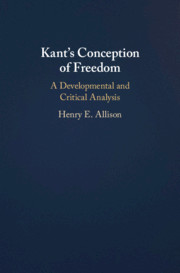Book contents
- Kant’s Conception of Freedom
- Kant’s Conception of Freedom
- Copyright page
- Dedication
- Contents
- Preface
- Acknowledgments
- Note on Sources and Key to Abbreviations and Translations
- 1 Kant’s Writings of the 1750s and the Place in Them of the Free Will Issue
- 2 Kant’s Theoretical Philosophy in the Early 1760s and Its Relation to His Conception of Freedom
- 3 Kant’s Moral Philosophy in the Early 1760s
- 4 Kant’s Dialogue with Rousseau Supplemented by His Dreams of a Spirit-Seer
- 5 From the “Great Light” to the “Silent Decade”: Kant’s Thoughts on Free Will 1769–1780
- 6 Kant’s Account of Free Will in the Critique of Pure Reason
- 7 From the Critique of Pure Reason to the Groundwork
- 8 The Fact of Reason and Freedom in the Critique of Practical Reason
- 9 The Critique of the Power of Judgment and the Transition from Nature to Freedom
- 10 Kant’s Final Thoughts on Free Will
- Bibliography
- Index
6 - Kant’s Account of Free Will in the Critique of Pure Reason
Published online by Cambridge University Press: 19 December 2019
- Kant’s Conception of Freedom
- Kant’s Conception of Freedom
- Copyright page
- Dedication
- Contents
- Preface
- Acknowledgments
- Note on Sources and Key to Abbreviations and Translations
- 1 Kant’s Writings of the 1750s and the Place in Them of the Free Will Issue
- 2 Kant’s Theoretical Philosophy in the Early 1760s and Its Relation to His Conception of Freedom
- 3 Kant’s Moral Philosophy in the Early 1760s
- 4 Kant’s Dialogue with Rousseau Supplemented by His Dreams of a Spirit-Seer
- 5 From the “Great Light” to the “Silent Decade”: Kant’s Thoughts on Free Will 1769–1780
- 6 Kant’s Account of Free Will in the Critique of Pure Reason
- 7 From the Critique of Pure Reason to the Groundwork
- 8 The Fact of Reason and Freedom in the Critique of Practical Reason
- 9 The Critique of the Power of Judgment and the Transition from Nature to Freedom
- 10 Kant’s Final Thoughts on Free Will
- Bibliography
- Index
Summary
Having completed our survey of Kant’s thoughts on free will during the “Silent Decade,” we are in a position to examine his account in the first Critique. The task is complicated, however, by the fact that Kant discusses the issue in two distinct places in the work: the Transcendental Dialectic in connection with the Third Antinomy and the Canon of Pure Reason in the Transcendental Doctrine of Method. Moreover, these two accounts have often been thought to be incompatible, with the former containing the genuinely “critical” view and the latter vestiges of Kant’s earlier views discussed in Chapter 5, which has led to the application of the so-called patchwork thesis to his accounts of freedom in the first Critique. In previous discussions of this issue, I have argued against this view, claiming that the two accounts are compatible and that in order to recognize this it is necessary to view them in light of the distinct tasks of the portions of the Critique in which they are located.1 I shall adopt the same strategy here, though I shall focus not only on the discrepancies, real and apparent, between the two accounts, but also on the relation of both to Kant’s fragmentary accounts in the “Silent Decade,” which exhibited many of same tensions. Inasmuch as it is not only the first and most important discussion of the topic in the Critique, but also the foundation for all of Kant’s subsequent treatments of it, the former account will receive the bulk of our attention. The chapter is divided into five parts, with the first four devoted to the account in the Dialectic. These deal respectively with the nature and source of the antinomial conflict, the thesis and antithesis arguments of the Third Antinomy, Kant’s claim that transcendental idealism is the key to the resolution of this conflict, and the lengthy account of freedom based upon this analysis.
- Type
- Chapter
- Information
- Kant's Conception of FreedomA Developmental and Critical Analysis, pp. 234 - 298Publisher: Cambridge University PressPrint publication year: 2020



